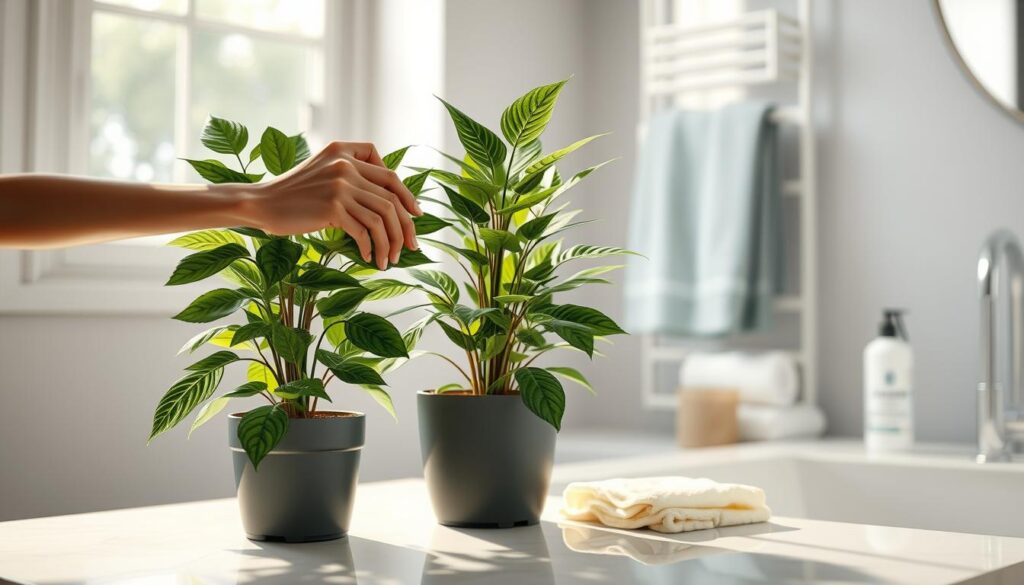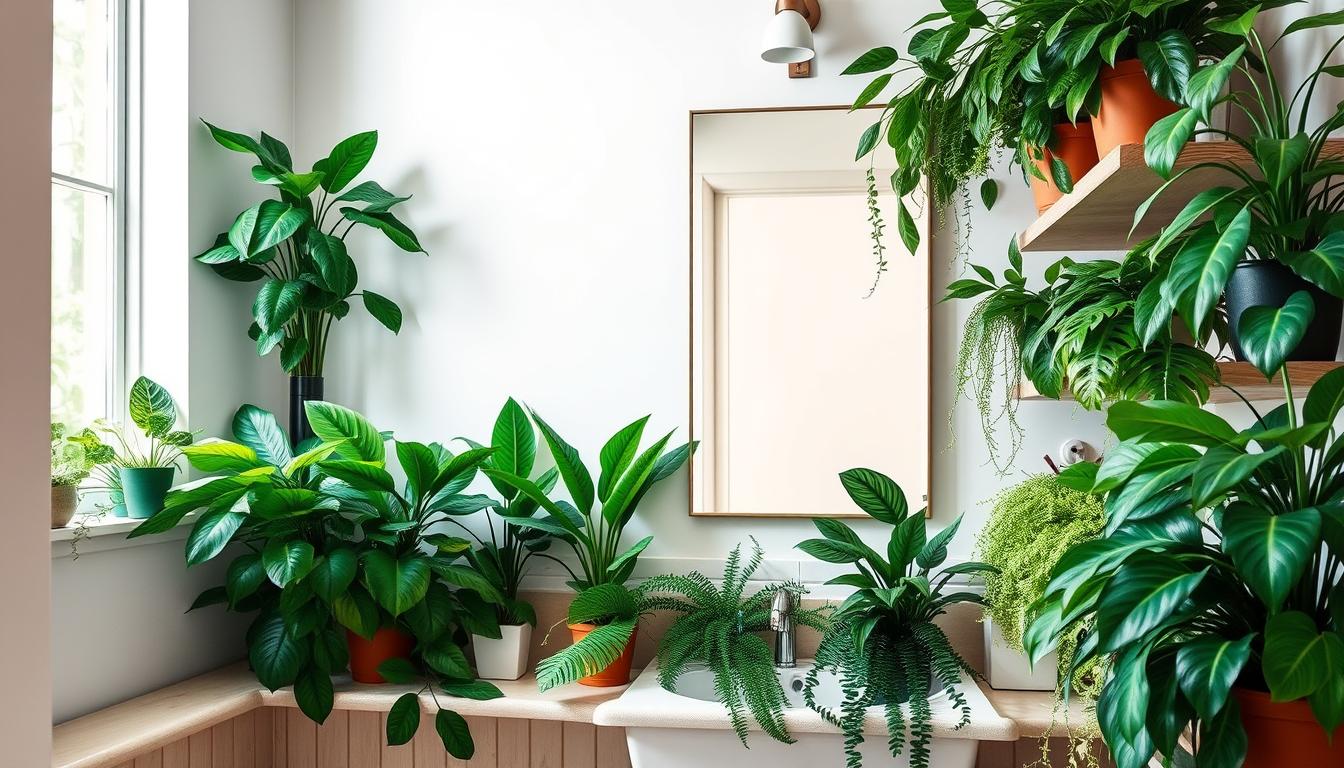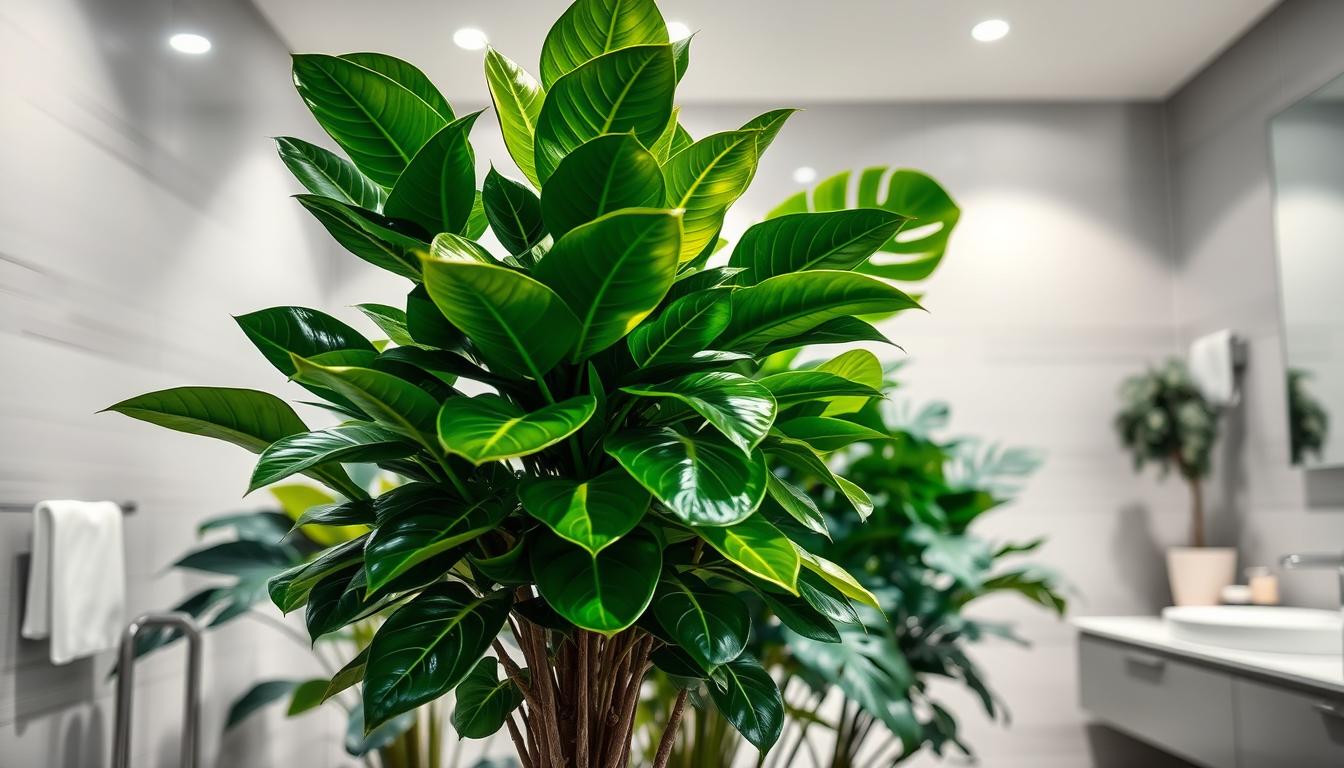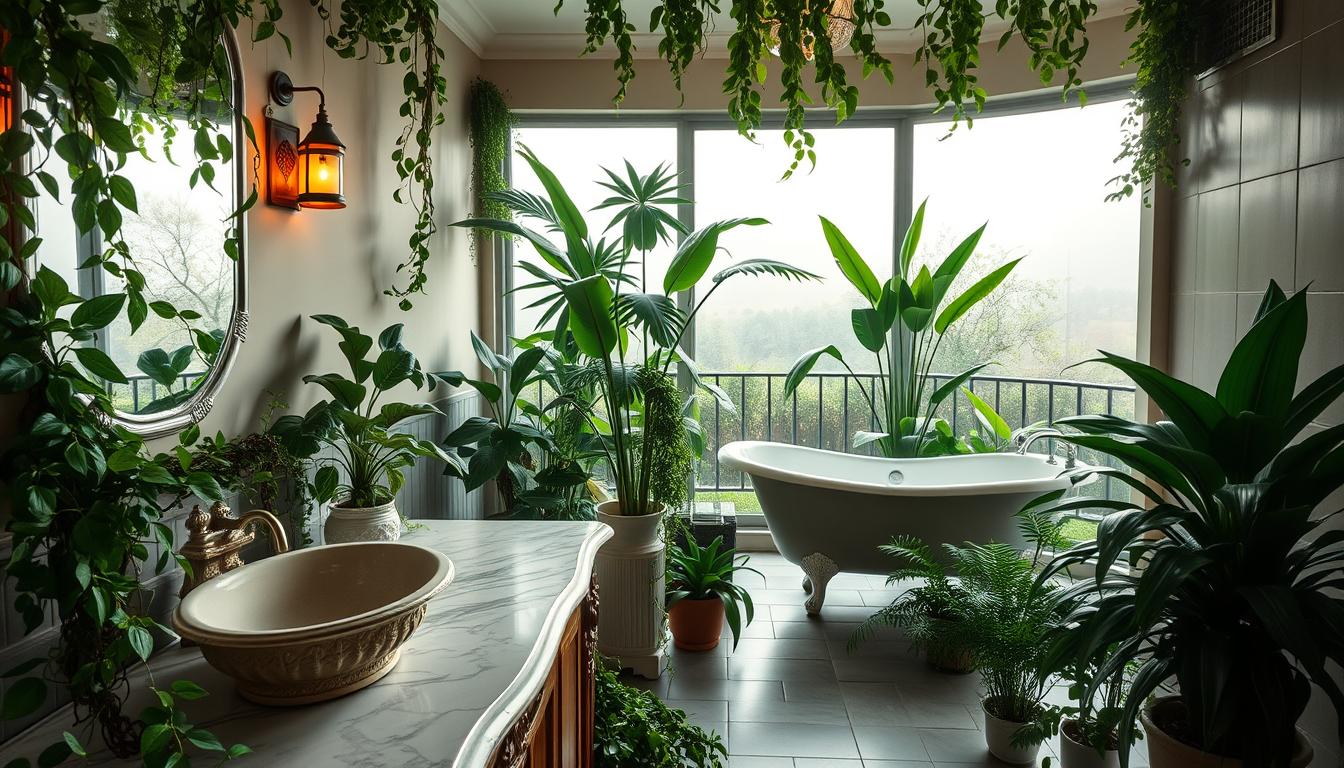Keeping your fake plants looking good in moist bathrooms is tough. These areas attract dust and have moisture problems. You need to stay on top of cleaning to keep your artificial greenery fresh. Knowing the right cleaning methods improves your bathroom’s look. It makes the air healthier by lowering allergen levels. We’ll show you easy ways to keep your plants dust-free and looking great.
Importance of Keeping Fake Plants Clean
Keeping fake plants clean matters a lot. Clean fake plants make your home look better. Without dust, they seem brighter, making your space prettier. If they get dusty, they’re not as nice, which can make your place look less beautiful.
Enhancing Home Decor
Clean fake plants can really wow in a room. By cleaning them regularly, they keep looking bright. This makes your home’s design look better. They can turn into eye-catching features, making your space feel nicer.
Reducing Dust and Allergens
Washing fake plants helps cut down on dust and allergens at home. Over time, dust piles up on these plants, which might cause allergies or breathing problems. Cleaning them makes your home healthier and more welcoming.
Understanding Materials Used in Fake Plants
The choice of materials affects how fake plants look and how to care for them. Knowing about different materials helps pick the right way to clean each type. Most fake plants are made of plastic or silk. Each has its benefits and needs for cleaning.
Common Materials: Plastic, Silk, and more
Plastic plants are liked for being strong and easy to look after. They can handle moist environments well, making them great for bathrooms. Silk plants, however, look more real but need to be treated more carefully. It’s important to know the difference between plastic and silk to keep them looking good.
Choosing the Right Cleaning Method Based on Material
It’s crucial to choose the correct cleaning methods for fake plants based on their materials. For plastic plants, using soap and water can clean dirt and grime well. Silk plants need softer care; a slightly wet microfiber cloth is best to avoid damage. The right cleaning methods will make artificial plants last longer and stay beautiful.
How to Keep Fake Plants Dust-Free in High-Humidity Bathrooms
Keeping fake plants dust-free in humid bathrooms is tricky. The moisture makes dust stick more, so cleaning regularly is key. By setting a regular cleaning routine, your plants will look good. It also makes the air healthier for you.
Frequency of Cleaning
Setting a cleaning schedule helps fake plants last longer and stay beautiful. It’s best to dust them at least once a week. If your bathroom is very humid, do it every other week. This stops dust from building up too much.
Dusting Techniques
The right dusting methods keep your fake plants looking good. Here are some tips:
- Use soft-bristle brushes to brush off the dust gently.
- Microfiber cloths are great because they catch dust without scratching.
- Always start cleaning from the top to make sure you don’t miss any spots.
Using these dusting tips will help your fake plants stay clean. This is especially important in humid places.
Easy Steps to Clean Your Fake Plants
Cleaning fake plants is easy and makes them look better. With the right steps, you can keep them looking fresh. Follow these methods for effective cleaning.
Using Soap and Water
Soap and water are great for cleaning, especially for plastic plants. Start by mixing warm water with a gentle dish soap, like Mrs. Meyer’s. Gently dip the plants in and let them soak for a bit.
Then, wipe them with a soft cloth or sponge. Rinse well with clean water and let them dry in the air.
Using Vinegar for Spot Cleaning
Vinegar is great for tough stains. Mix vinegar and water equally in a spray bottle. Spray it on the spots and wait a few minutes to loosen the dirt.
Wipe it with a clean cloth afterwards. This method is safe for the plants and keeps them looking great.
Tools You Need for Cleaning
For fake plants to look their best, you need the right tools. These tools help keep your plants looking good for a long time. Here’s what you should use.
Soft-Bristle Brushes
Soft-bristle brushes are perfect for gentle dusting. They won’t harm delicate leaves. These brushes get into all the small spaces for a complete clean. Look for brushes that are flexible to fit the plants’ shapes.
Microfiber Cloths
Microfiber cloths are great at catching dust. They’re soft so they don’t scratch. Use them often to keep your plants bright and clean, without harsh chemicals.
Dishwashing Solutions
A mild dishwashing solution can really help clean. It works well on plastic plants, breaking down grease. Mix it with water for a safe, deep clean of your plants.
Tips for Maintaining Clean Fake Plants
Cleaning artificial plants makes them look better and helps keep the air in your home clean. It’s important to dust them regularly to keep them looking new. Adding simple cleaning steps to your week can make caring for them easier.
Regular Dusting Routines
To keep your fake plants looking great, make a dusting schedule that works for you. Dusting often stops buildup that can make your plants look dull. Below are some tips to help:
- Use a soft microfiber cloth to gently wipe the leaves and stems.
- Incorporate dusting into your weekly cleaning tasks, focusing on high-traffic areas.
- Utilize a soft-bristle brush for hard-to-reach spots.
Creating a Cleaning Schedule
Creating a plan that fits the types of your fake plants makes cleaning easier. Knowing what each plant needs means less work to keep them looking their best. Here are some ideas:
- Assign cleaning tasks based on the type of plant, such as silk or plastic.
- Schedule deep cleaning sessions every month for detailed care.
- Track your cleaning habits to assess what works best, enhancing your dusting routines.

Common Cleaning Mistakes to Avoid
Keeping fake plants clean seems easy, but many mistakes can mess up your work. Knowing what to avoid makes your silk plant last longer and stay vibrant.
Using Harsh Chemicals
Many think using strong cleaners is best. This isn’t true for fake plants. Harsh chemicals can fade and damage them. Instead, use gentle soap and water for safe and effective cleaning.
Over-Wetting Silk Plants
Too much water is also a problem. It can change their shape or make the color bleed. It’s important to be gentle to keep them looking great.
Signs Your Fake Plants Need Cleaning
Knowing when your fake plants are dirty is key. Spotting the need for a clean makes them look better and last longer. Look out for dust and mildew, especially if it’s humid.
Visible Dust Accumulation
You can easily tell fake plants need a clean when dust builds up. This dust isn’t just ugly; it can make allergies worse. Check regularly to keep them looking good and safe to have around.
Signs of Mildew in Humid Environments
Mildew on your fake plants is a big warning sign in damp places like bathrooms. Discoloration, a musty smell, or fuzzy spots mean mildew is growing. Clean them right away to stop damage and keep them pretty.
Conclusion
Keeping fake plants clean in humid bathrooms is key to both looks and health. It’s important to keep a clean space that looks good and is healthy. Using the right cleaning ways, you can keep artificial plants looking fresh.
Clean artificial plants make your living space healthier, not just nicer. Knowing what your fake plants are made of helps. This way, you can enjoy their beauty all year without dust and mold.
Cleaning your plants well makes them last longer and brightens your home. Making cleaning a regular task helps improve your space. It brings a sense of pride in keeping your environment tidy.



